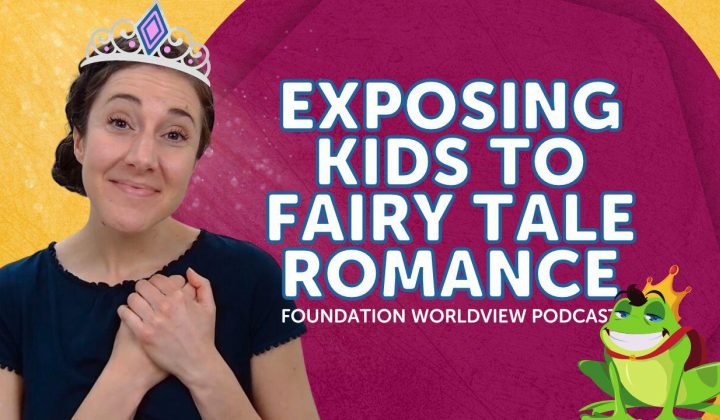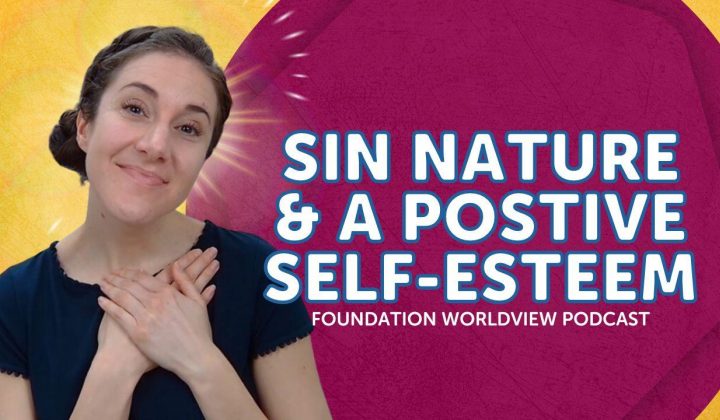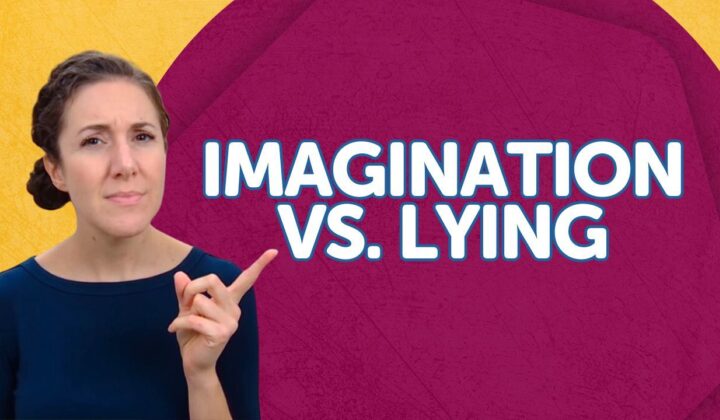Learn more about the journey that led to us equipping kids to carefully evaluate every idea they encounter.
Meet members of our team who have contributed to curriculum development.
Hear from real users of the Foundation Curriculum.
Learn what we believe about God, Jesus, Scripture, and more.
Beyond Good Guy, Bad Guy: Teaching Kids Biblical Good and Evil
Today's question says, "I'm struggling to explain morality and the gospel to my five-year-old in fairytales. She often categorizes characters into all good or all bad, and I don't think it should be as simple as be good like Cinderella. Do you have any advice?"
Transcript
Note: The following is an auto-transcript of the podcast recording.
Hello friends, and welcome to another episode of the Foundation Worldview podcast where we seek to answer your questions so that you can equip the children that God has placed in your care to carefully evaluate every idea they encounter and understand the truth of the biblical worldview. I'm your host, Elizabeth Urbanowicz, and I'm thrilled that you've joined me today for another episode. Today's question says, "I'm struggling to explain morality and the gospel to my five-year-old in fairytales. She often categorizes characters into all good or all bad, and I don't think it should be as simple as be good like Cinderella. Do you have any advice?" Yes, I think this is a great question, and yes, I do have advice because I think naturally children who are probably around the age of six and under, naturally have this good guy, bad guy, just category. And I don't think it's necessarily all bad because we do want our children to understand that there is something as good that good aligns with God's character and that there is something as bad, that bad is what goes against God's character. However, you are right that there is no such thing as a person who is all good because no one is good except God alone, and there is no such thing as a person who is all bad because all humans are bear the image of God. So how can we help move our little ones beyond this just typical good guy, bad guy paradigm? So really good question for us to think through.
Before we dive down deep into this question. If you have a question that you would like for me to answer on a future Foundation Worldview podcast, you can submit that question by going to FoundationWorldview.com/podcast. Also, just ask that you invest a few seconds that it takes to rate this content to just help us get it out to more individuals so that we can equip as many Christian adults as possible to get the kids in their care to carefully evaluate every idea they encounter.
Now, for those of you who are watching or listening who have taken the children in your care through our Biblical Worldview curriculum, if you're thinking through this question, how do we move outside of the good guy, bad guy paradigm would highly recommend that you watch the videos again from unit four in that curriculum because they directly speak to this issue and they should set the stage for framing it. And we have specifically designed our Early Childhood curriculum, so our curriculums for kids ages four plus to be almost watched like a show that you would watch after quiet time so that you would watch them again and again and again and again to really solidify these concepts. That's our goal with these curriculums, that the truths covered in each lesson that they would become just a foundation of understanding for your children and that they would then be a springboard for thousands of little conversations that you have in everyday life. So if you're currently going through that curriculum, when you get to unit four, it's going to directly speak to this. If you've already gone through unit four, highly recommend you go over it again with your kids. Now, if you have not taken the kids in your care through our Biblical Worldview curriculum, do highly recommend that you check out those materials. But here are just some basic truths that we cover in that unit.
Now, this isn't a comprehensive overview of the unit, but it is just some of the basic truths that we cover that you can talk through with your children. So a few important truths about humans that really need to lay the foundation for any conversation that we're going to have with our children about morality and about the characters that they encounter in stories and fairytales and movies and shows and books, all of those things.
So the first principle that's really important to cover is that humans bear God's image. And this truth is rooted in Genesis chapter one, verse 27, which says, "So God created man in his own image, in the image of God he created them; male and female he created them." So we can read this passage with our children and say, okay, what truth is revealed about how God created humans? God created humans in his image now in our Biblical Worldview curriculum. The next lesson after this, we cover that God designed us as male or female image bearers because that's another truth revealed in this verse. Now that's with what we're talking about here with good guy versus bad guy. That's not a truth that's foundational to that. So I'm going to skip over that one, but that is a truth that we cover in that curriculum.
Another truth covered in that unit that we should go through with our children is that humans miss the mark. Humans miss the mark because that is what the word sin, I'm going to pronounce it wrong because I am not a Greek scholar but hamartia in the Greek, which means sin. It means to miss the mark. And a verse that makes this very clear is Romans three, verse 23, which says, "for all have sinned and fall short of the glory of God,". So ask our children, okay, what truth about humans is revealed in this verse that every single human has sinned. No one has lived up to God's perfect standard. We all miss the mark.
And then another really important truth to cover is that Jesus hit the mark for us. And this truth is revealed very clearly in Romans chapter five, verse eight, which says, "But God shows his love for us in that while we were still sinners, Christ died for us." And so ask our kids, okay, what truth about humans is revealed in this verse that Jesus died for us even when we are still stuck in our sin. Jesus hit the mark for us. We could never hit it perfectly because we bear Adam's sin, but Jesus hit it for us.
So these are three truths to discuss with our kids and to anchor in Scripture that humans bear God's image. Humans miss the mark and Jesus hit the mark for us. And these are things that you're going to want to review with your kids over and over and over and over and over again. Because sometimes as parents, we get the wrong understanding that we should explain things to our kids once or we should talk about things with our kids once and they should get it. Where that's not the way the human brain was designed to learn. Now, I don't know, before the fall, if God designed it, our brains would learn something once and we'd know it perfectly. But on this side of Genesis three, our minds do not learn things after one exposure. That brain researchers have found that on average it takes the human mind seven exposures to the same content before that content actually becomes part of our everyday thinking. And we actually have neurological pathways through which the information travels, and so that we're actually thinking according to this truth.
So if you are going through these three truths with your kids, you're going to want to go over them over and over and over and over and over the course of multiple days and multiple weeks. And those of you who have taken your kids through our Biblical Worldview curriculum, that's what we do. We review the truths over and over and over and over again because brain research has shown on average we need seven exposures to the same content.
So after we've gone over these three truths with our kids, that humans bear God's image, humans miss the mark, and Jesus hit the mark for us. The next thing to do would be to discuss these concepts as they come up in stories. So the questioner wrote in about a Cinderella example. So this is something that after you read the story of Cinderella, or after you watch the movie Cinderella, or after you watch a Disney Plus show on Cinderella to talk with our kids, say, okay, now is Cinderella a real person or is she make-believe? That's right she's make-believe. And so the wicked stepmother, is she a real person or is she make-believe? That's right, she's make-believe too. Now, let's think about this. If they were real people, if Cinderella were real and the wicked stepmother were real, what would we know to be true about both of them and then go over these truths again. We would know that if they were real, if Cinderella were real and the wicked stepmother were real, they would both be image bearers. They would both bear God's image, which means they have worth and value that no one can take away. Okay? If Cinderella and the wicked stepmother were real, what other truth would we know about them? That's right. We would know that they both miss the mark. Now, in the story of Cinderella, who missed the mark more? That's right. The wicked stepmother missed the mark more in the story, but if Cinderella were real, would she still miss the mark? Mhm, that's because nobody lives up to God's perfect standard. So even though the wicked stepmother missed the mark more, Cinderella also would miss the mark as well. Would anybody ever be able to perfectly hit the mark? No. Only Jesus could do that. So if Cinderella and the wicked stepmother were real, what's another truth that we would know about them? Right, that Jesus hit the mark for them. So if they turned from their sin and trust in Jesus, they would be brought to new life in him.
So you can apply this to any story that you read. Now, older stories like Cinderella and fairytales like that, they're going to have more of the good guy, bad guy paradigm, where in most stories or movies that have been written after the year, probably around 2010, they're not so much going to have good guy, bad guy. They're more going to have all of the bad characters change their ways.
I remember several years ago when my oldest nephew was three, he was obsessed with cars like the movie cars. Now, there were certain parts of the movie my sister-in-Law and brother wouldn't let them watch, but he was obsessed with the movie cars, and he loved cars one and cars three. And I remember when he would be talking about Jackson Storm, the Bad Guys in the Bad Guy in Cars three, and he was like, but in the end, he changed his ways. And so suddenly Jackson Storm became, at least I think I've never seen the movie suddenly Jackson Storm became a good guy because he changed his ways.
When watching a story like that, a more modern story where they're really, anybody who's supposedly bad just changes their ways in the end and they're suddenly good. We can ask our kids, does doing good things make us good guys? And probably most children are immediately going to say yes, because we just have this paradigm that if we do good things, we're a good guy where we can take them back to Scripture and say, okay, what does Romans three verse 23 say? "for all have sinned and fall short of the glory of God?" We can also take them to where Jesus says, no one is good, but God alone. And so, yeah, doing good does not make us good guys. Only Jesus can make us good because only Jesus hit the mark perfectly every time. So we want to help our kids see that through these stories, and then we can talk to them once Jesus has done that. Once Jesus has made us new, we can honor him by doing good. So doing good is a very good thing because it honors God. However, doing good things is not what makes us good. Only Jesus can make us good.
So I hope this paradigm is one that those of you watching and listening can take and apply in any situation. And we need to remember, I think I alluded to this at the beginning, but I might not have made it very clear. The fact that our kids thinking good guy, bad guy, paradigm is not a bad thing. It's actually good that they're recognizing that certain things are good, that they align with God's character and that certain things are bad. They go against God's character. But what we need to do is we need to make sure we anchor them in the truth that all humans bear God's image. So there is no such thing as a person who is all bad. Okay?
Now, you might be thinking, Elizabeth, but what about total depravity? Well, yes. Has every part of us been corrupted by sin? Yes. However, God still chose to redeem us because the image of God was not removed from us when we all fell in Adam. So all humans have inherent value, dignity and worth. We bear God's image. Second truth, humans miss the mark. All humans have sinned against God, and Jesus hit the mark for us. It's only through Jesus that we can be redeemed, that we can be turned into good guys. That's the only way we can be redeemed. And then once we've anchored our kids in these truths, then we can apply those in any story that they're engaged in, whether it's a fairytale, whether it's a Disney movie, whether it's another story that they're listening to, that then we can have these conversations with them.
Again, as I mentioned in the beginning, this is something that our Biblical Worldview curriculum directly goes through for an entire five lessons in unit four of that curriculum. So if you haven't checked that curriculum out yet, highly recommend that you do that because our goal in these curriculums is to build this firm foundation that's then going to be a springboard for you to have thousands and thousands of conversations over the year implementing these truths in every aspect of life with your kids.
Well, that's a wrap for this episode. But as always, my prayer for you as we leave this time together is that no matter the situation in which you and the children God has placed in your care, find yourselves that you would trust that God is working all things together for your good by using all things to conform more into the image of the Son. I'll see you next time.
Related Posts and insights

Exposing Kids to Fairy Tale Romance
Today's question says, "Is there a connection between introducing romance, even innocent romance, in movies and books at a young age, ie Disney animated movies, et cetera, and a child's interest in romantic relationships, dating, sex, or porn?"

Talking To Kids About Their Sin Nature without Damaging Their Self-Esteem
In this episode of the Foundation Worldview podcast, host Elizabeth Urbanowicz answers a question that many Christian parents may have: how do we teach young children about their value and worth to God while also discussing the concept of sin?

Imagination vs. Lying: Helping Kids Understand the Difference
Today's question says, "How do we balance encouraging a child's imagination while also encouraging truth-telling and disciplining them for lying?"





